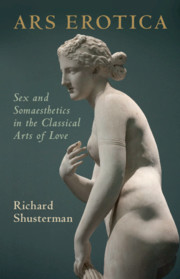Book contents
- Ars Erotica
- Ars Erotica
- Copyright page
- Dedication
- Contents
- Preface
- Abbreviations
- 1 Ars Erotica and the Question of Aesthetics
- 2 Dialectics of Desire and Virtue
- 3 The Biblical Tradition
- 4 Chinese Qi Erotics
- 5 Lovemaking as Aesthetic Education
- 6 Fragrance, Veils, and Violence
- 7 From Romantic Refinement to Courtesan Connoisseurship
- 8 Commingling, Complexity, and Conflict
- Bibliography
- Index
2 - Dialectics of Desire and Virtue
Aesthetics, Power, and Self-Cultivation in Greco-Roman Erotic Theory
Published online by Cambridge University Press: 19 March 2021
- Ars Erotica
- Ars Erotica
- Copyright page
- Dedication
- Contents
- Preface
- Abbreviations
- 1 Ars Erotica and the Question of Aesthetics
- 2 Dialectics of Desire and Virtue
- 3 The Biblical Tradition
- 4 Chinese Qi Erotics
- 5 Lovemaking as Aesthetic Education
- 6 Fragrance, Veils, and Violence
- 7 From Romantic Refinement to Courtesan Connoisseurship
- 8 Commingling, Complexity, and Conflict
- Bibliography
- Index
Summary
The Greeks provided Western culture with the foundations for whatever aesthetic richness its erotic theory enjoys. This includes the paradoxical eros of chastity that Christianity developed by drawing on Greek models of philosophical idealism and asceticism, whose influence continued through the Roman Empire when Christianity absorbed them. The richness of Greek erotic thought lies partly in its multiple ambiguities, and part of this ambiguity can be traced to the polysemic polytheism of Greek religion, whose influence on Roman civilization also impacted its erotic theory. Although the Greek god Eros (whom the Romans called Cupid) gave eroticism its name, he was not the only god central to Greek views of lovemaking and sexual desire. Aphrodite, goddess of love and beauty (known as Venus in Rome), also played a defining role. Moreover, within each of these two seemingly singular Greek gods we find a nest of divergent personae or meanings. Greek mythology provides us with at least three different forms of the god Eros. The first Eros to appear, in Hesiod’s Theogony (116), is not the familiar chubby, child-like, winged son of Aphrodite. Instead, Hesiod portrays Eros as one of the very first or oldest gods, existing before the birth of Aphrodite and the other Olympians. “Verily at the first Chaos [Air] came to be, but next wide-bosomed Earth [Gaia], the ever-sure foundation of all the deathless ones who hold the peaks of snowy Olympus, and dim Tartarus [Hell] in the depth of the wide-pathed Earth, and Eros [Love], fairest among the deathless gods, who unnerves the limbs and overcomes the mind and wise counsels of all gods and all men within them.”1
- Type
- Chapter
- Information
- Ars EroticaSex and Somaesthetics in the Classical Arts of Love, pp. 30 - 97Publisher: Cambridge University PressPrint publication year: 2021



